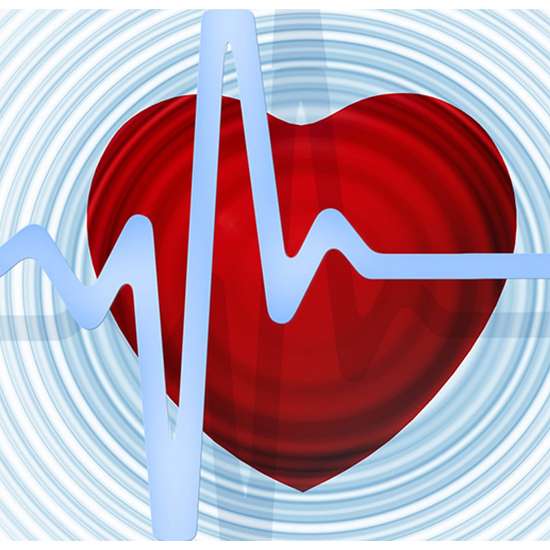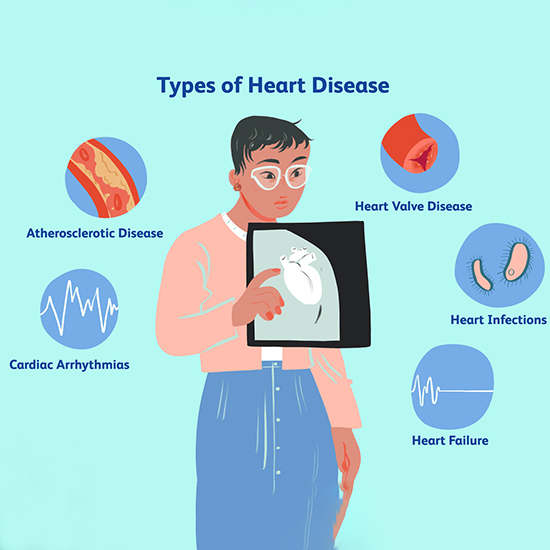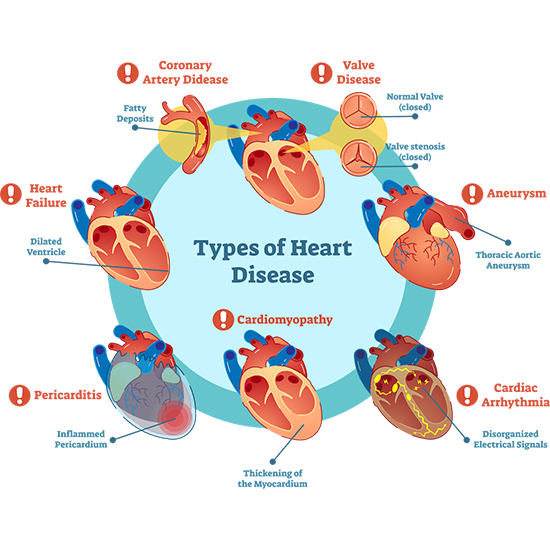
Heart diseases are one of the most common diseases that cause death. As per the World Health Organization in 2022, the rate of coronary heart disease has increased from 1.6% to 7.4% in rural areas and has increased from 1% to...
Heart diseases are one of the most common diseases that cause death. As per the World Health Organization in 2022, the rate of coronary heart disease has increased from 1.6% to 7.4% in rural areas and has increased from 1% to 13.2% in urban areas.
Overview
Heart disease is a medical issue that affects heart health. Various heart health issues are not only affecting the heart but sometimes becoming the cause of death in both men and women such as:
- Coronary Artery Disease
- Irregular heartbeat
- Heart valve-related disease
- Congenital heart disease
- Heart muscle disease etc.
Symptoms of Heart-Related Diseases

Every heart disease causes different symptoms. You can say that the symptoms of heart-related diseases depend on the type of heart issues you are suffering from.
But some common symptoms of heart disease are:
- Chest pain and discomfort
- Shortness of the breath
- Excessive sweating
- Chest Tightness
- Irregular heartbeat etc.
Causes of heart-related diseases

- Lack of physical activities
- Smoking
- High cholesterol level
- Hypertension
- Obesity
- Diabetes
- Blood clots
- Family history of heart diseases
Types of Heart Disease

- Coronary Artery Disease: Coronary artery disease is a medical condition that affects the coronary artery which supplies blood to the heart muscles. When the cholesterol deposits build up in the arteries of the heart, then it reduces the flow of blood to the heart and causes coronary artery disease. Coronary artery disease leads to a heart attack, chest pain, or stroke.
- Heart arrhythmias (Irregular Heart Rhythm): In this condition, your heart doesn’t beat normally, it either beat very high or very low. The irregular heart rhythm indicates that there is a problem. It can lead to severe heart issues
- Congenital heart disease: Congenital heart disease means birth defects (a problem in the heart structure since birth) that affect normal heart functioning and lead to chronic heart issues.
- Heart valve disease: Various conditions cause damage to the valves of the heart and may make it leaky, narrow, etc. The damage to the valves known as Heart valve disease (Valvular heart disease) causes the heart’s valves to work abnormally.
- Heart muscle disease: Heart muscle disease is the heart muscle disease that affects the heart pumping blood to the rest of the body. The problem in the heart pumping leads to the failure of the heart.
Diagnosis of the Heart Related Disease
Diagnosis of heart-related disease involves multiple tests. It helps the doctor in deciding the treatment therapy to get rid of the problem and prevent the problem from being life-threatening. Depending on the condition and symptoms, doctors recommend blood tests, and diagnostic and imaging procedures such as:
- Complete Cholesterol test
- Echocardiography (Echo)
- Electrocardiogram (ECG)
- Treadmill Test (TMT)
- Holter Monitor
- Stress Test
- CT Coronary Angiography etc.
Complete Cholesterol Test
A complete cholesterol test covers such as total cholesterol, low-density lipoprotein (LDL) cholesterol, High-density lipoprotein (HDL) cholesterol, and triglycerides to measure the levels of fat and cholesterol in your blood.
Echocardiography (Echo)
Echocardiography (Echo) is a non-invasive diagnostic procedure also known as an ultrasound of the heart. It uses sound waves to image your heart to detect the problems related to heart valves and heart muscles.
Electrocardiogram (ECG)
The Electrocardiogram (ECG) is a non-invasive procedure that is used to monitor the heart’s electrical activities to detect damage to the heart as well as irregular heartbeat.
Treadmill Test (TMT)
A treadmill Test (TMT) is used to determine the effect of exercise on your heart the walking on the treadmill. This test monitors the heart’s electrical activities while exercising on the treadmill and helps detect coronary artery disease and abnormal heart rhythm.
Holter Monitor
Holter monitor test is used to monitor the heart rhythm throughout 24 to 48 hours. It is usually recommended when the result of ECG is not showing heart-related abnormalities such as irregular heart rhythm but you are developing the symptoms of the problem.
Stress Thallium Test
The stress thallium test is an imaging procedure that shows the flow of blood into the heart and how well it is flowing while you are at rest or exercising. This test detects the poor flow of blood into the heart, and damage to the heart and confirms whether you are at risk of heart attack
CT coronary angiography
CT (Computed Tomography) Coronary Angiography is a sophisticated imaging technique used to identify patients with suspected coronary artery disease. It helps in the detection of soft, hard, as well as calcified plaques that are associated with an increased risk for highly unfavorable heart-related events such as heart attacks. It has proved a boon for heart patients because it improves the accuracy and precision of the detection of high-risk plaque in clinical practice. There is no doubt that patients with type 2 diabetes, hypertension, high cholesterol levels, obesity, etc. are at a high risk of heart-related diseases such as coronary artery disease. According to research, coronary artery disease is one of the leading causes of death. The CT coronary angiography improves the diagnosis because it confirms whether the patients have developed CAD.
Words from the expert
Dr. Ravin Sharma (M.D. in Radiology) says that the frequency of heart diseases, especially heart attacks, has witnessed a surge. By checking our cardiac arteries for blockage on a routine basis, we can easily prevent heart attacks because blockage in the arteries is the main cause of heart attacks. CT Coronary Angiography is an ideal test for the timely detection of blockage in the heart arteries and is helpful in the prevention of a heart attack before it strikes. This test detects the obstruction in heart arteries at an early stage and helps in the prevention of heart attacks using very low amounts of radiation. So, it is a highly effective and safe procedure compared to other diagnostic procedures for the detection of heart health issues.
Before undergoing the scanning procedure, every individual must keep a few things in mind:
- Fasting for 4-6 hours is required.
- Patient women must consult the doctor because the radiation can harm the fetus.
- Inform your doctor if you have any kind of allergy reaction.
Knowing about your coronary artery disease is the first step towards the management and prevention of heart-related issues from getting worse.
Conclusion
CT (Computed Tomography) Coronary Angiography is an imaging procedure that uses computed tomography and contrast dye to produce a 3-D picture of the heart. It takes only a few seconds to detect the blockage or narrowing of the coronary arteries. This procedure is usually recommended when a patient experiences discomfort and pain in the chest area but the result of other diagnostic procedures such as an ECG is normal. Aside from that, the doctor recommends this procedure to patients who have coronary artery disease and an increased heartbeat. Depending on the condition of the patient, the doctor decides whether the problem can be cured with the help of medications or requires a stent or bypass surgery.
If you or your loved ones are experiencing heart-related problems, then CT coronary angiography is the one-stop solution to prevent heart attacks and heart failure by knowing about the health of your heart and detecting the blockage in the arteries.
Ganesh Diagnostic and Imaging Center is the best diagnostic center for CT coronary angiography and is highly equipped with advanced 128-Slice CT scan technology to detect problems with your arteries as it gives information about the coronary vessels. If you are suffering from diabetes, a high cholesterol level, high blood pressure, obesity, etc., then you must go for this test because these conditions are considered risk factors for coronary artery disease (CAD). This diagnostic procedure helps you get effective treatment for your heart-related issues and prevents them from becoming life-threatening.









